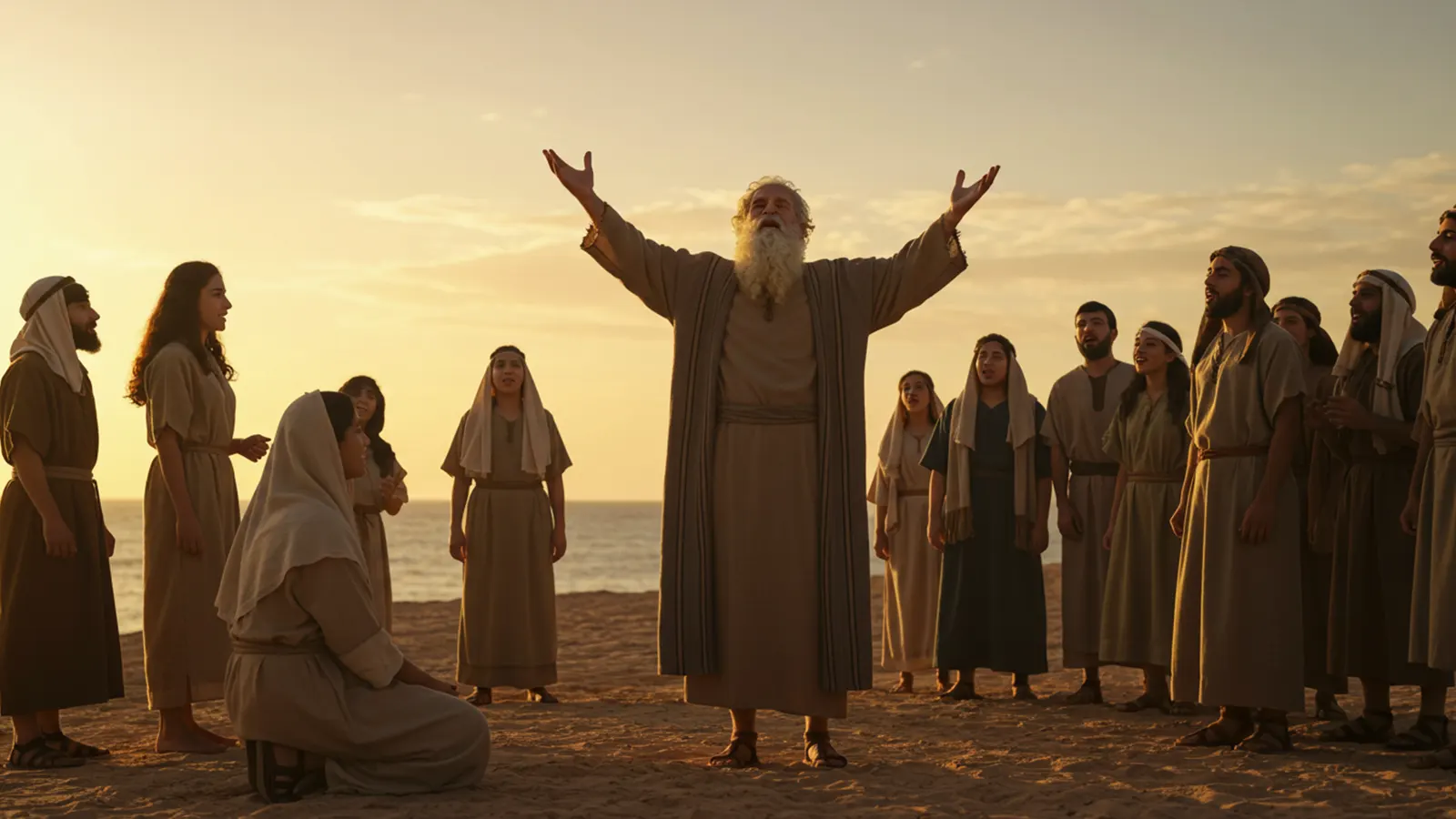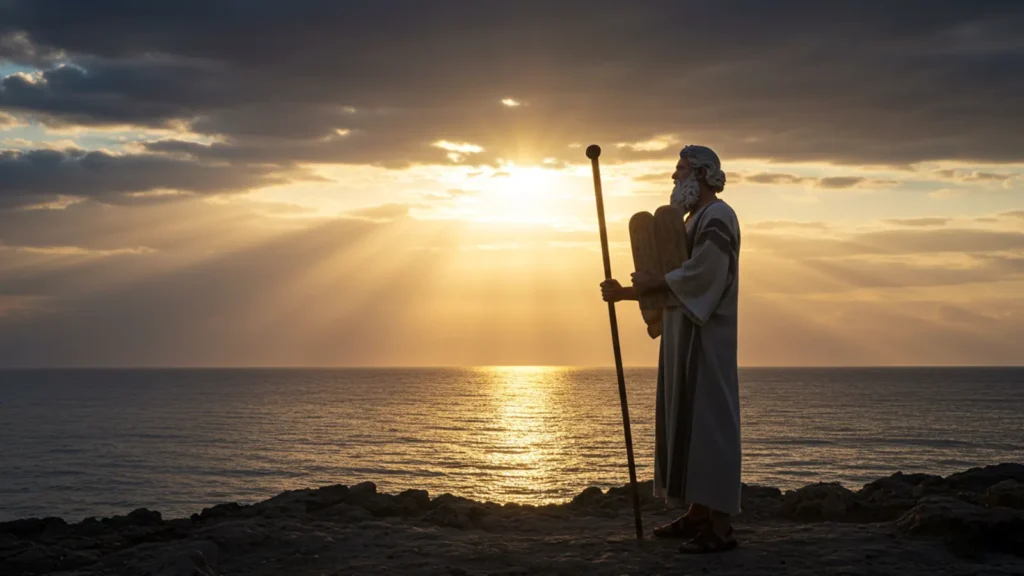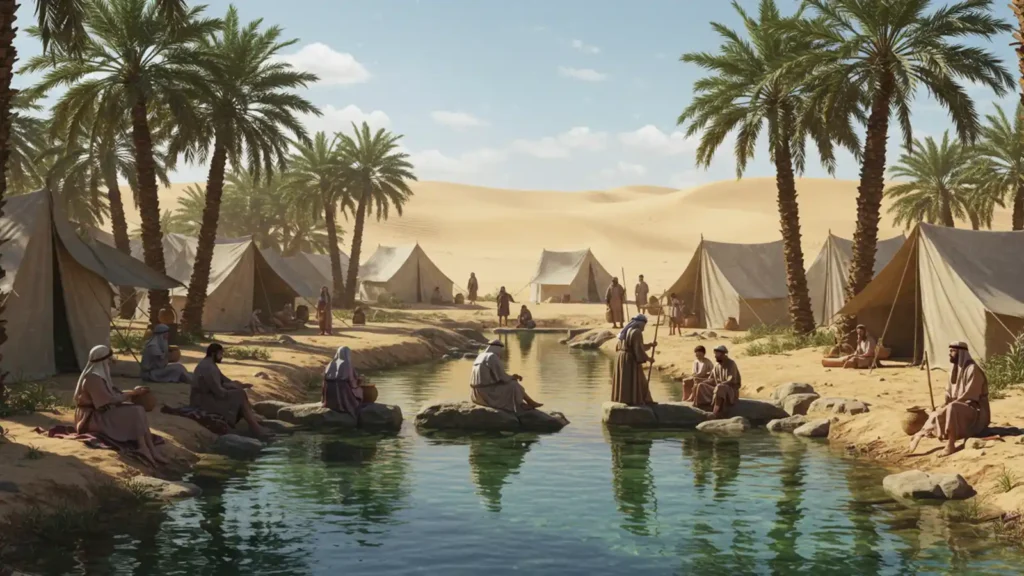Exodus 15 is one of the most striking chapters of the Old Testament, revealing the strength of faith and the power of God in delivering His people. The text records the song of Moses and Miriam, sung after the crossing of the Red Sea, when the Israelites were freed from Egyptian slavery and witnessed Pharaoh’s army being overwhelmed by the waters.
This moment was not just a military victory but a spiritual celebration of the Lord’s presence and power.
Quick summary of Exodus 15
The chapter of Exodus 15 is a song of victory and gratitude, sung by Moses and Miriam after the miracle of the Red Sea crossing. It celebrates God’s power, who delivered Israel from slavery and destroyed Pharaoh’s army. More than a historical hymn, the text expresses faith, worship, and confidence in divine sovereignty.
Main points of Exodus 15:
- It is the first recorded song in the Bible, exalting God’s strength and faithfulness.
- It portrays Israel’s spiritual and physical victory.
- It teaches that praise is the natural response to divine deliverance.
- It shows the transition from victory to the wilderness, with lessons at Marah and Elim.
- It reveals that God turns bitterness into blessing and leads to rest.
- It inspires Christians to worship amid trials, trusting that God continues to make a way.
In essence, Exodus 15 is a timeless reminder that God’s power conquers the impossible and turns pain into praise.
Exodus 15 NIV Complete
¹ Then Moses and the Israelites sang this song to the Lord: “I will sing to the Lord, for he is highly exalted. Both horse and driver he has hurled into the sea!
² The Lord is my strength and my song; he has become my salvation. He is my God, and I will praise him, my father’s God, and I will exalt him!
³ The Lord is a warrior; the Lord is his name.
⁴ Pharaoh’s chariots and his army he has hurled into the sea. The best of Pharaoh’s officers are drowned in the Red Sea.
⁵ The deep waters have covered them; they sank to the depths like a stone.
⁶ Your right hand, Lord, was majestic in power. Your right hand, Lord, shattered the enemy.
⁷ In the greatness of your majesty you threw down those who opposed you. You unleashed your burning anger; it consumed them like stubble.
⁸ By the blast of your nostrils the waters piled up. The surging waters stood up like a wall; the deep waters congealed in the heart of the sea.
⁹ The enemy boasted, ‘I will pursue, I will overtake them. I will divide the spoils and gorge myself on them. I will draw my sword and my hand will destroy them.’
¹⁰ But you blew with your breath, and the sea covered them. They sank like lead in the mighty waters.
¹¹ Who among the gods is like you, Lord? Who is like you— majestic in holiness, awesome in glory, working wonders?
¹² You stretch out your right hand, and the earth swallows your foes.
¹³ In your unfailing love you will lead the people you have redeemed. In your strength you will guide them to your holy dwelling.
¹⁴ The nations will hear and tremble; anguish will grip the people of Philistia.
¹⁵ The chiefs of Edom will be terrified, the leaders of Moab will be seized with trembling, the people of Canaan will melt away;
¹⁶ terror and dread will fall on them; by the power of your arm they will be as still as a stone— until your people pass by, Lord, until the people you bought pass by.
¹⁷ You will bring them in and plant them on the mountain of your inheritance— the place, Lord, you made for your dwelling, the sanctuary, Lord, your hands established.
¹⁸ The Lord reigns for ever and ever.”
¹⁹ When Pharaoh’s horses, chariots and horsemen went into the sea, the Lord brought the waters of the sea back over them, but the Israelites went through the sea on dry ground.
²⁰ Then Miriam the prophet, Aaron’s sister, took a tambourine in her hand, and all the women followed her, with tambourines and dancing.
²¹ Miriam sang to them: “Sing to the Lord, for he is highly exalted. Both horse and driver he has hurled into the sea.”
²² Then Moses led Israel from the Red Sea and they went into the Desert of Shur. For three days they traveled in the desert without finding water.
²³ They came to Marah, but could not drink its water because it was bitter. (That is why the place is called Marah.)
²⁴ So the people grumbled against Moses, saying, “What are we to drink?”
²⁵ Then Moses cried out to the Lord, and the Lord showed him a piece of wood. He threw it into the water, and the water became fit to drink. There the Lord issued a ruling and instruction for them and put them to the test,
²⁶ He said, “If you listen carefully to the Lord your God and do what is right in his eyes, if you pay attention to his commands and keep all his decrees, I will not bring on you any of the diseases I brought on the Egyptians, for I am the Lord, who heals you.”
²⁷ Then they came to Elim, where there were twelve springs and seventy palm trees, and they camped there near the water.

Introduction: the context of Exodus 15
Before understanding Exodus 15 in depth, it’s important to recall the prior setting. The people of Israel had been enslaved for centuries in Egypt, and God raised up Moses to deliver them. After the ten plagues and their triumphant departure, they found themselves before the Red Sea with the Egyptian army approaching. In that moment, the miracle happened: the sea parted, and the Israelites crossed on dry ground. When the Egyptians tried to follow, the waters closed over them and consumed them.
It is in this context that Exodus 15 is born— a hymn of gratitude and recognition of divine sovereignty.
The song of Moses and Miriam
The opening verse of Exodus 15 bursts with joy:
“I will sing to the Lord, for he has triumphed gloriously; he has hurled into the sea the horse and its rider.”
This song is considered the first hymn recorded in Scripture and represents the union of faith and worship. Moses and Miriam lead the people in spontaneous praise, exalting God’s justice, power, and faithfulness.
Structure of the song in Exodus 15
The song can be divided into three main parts:
- Praise for deliverance (Exodus 15:1–5) – celebrates deliverance from Egypt and the destruction of the enemy.
- Recognition of divine power (Exodus 15:6–12) – exalts the mighty arm of the Lord, who defeats evil.
- Hope in the promise (Exodus 15:13–18) – proclaims the people’s entrance into the promised land and God’s eternal kingship.
Each part reflects a dimension of the relationship between humanity and the Creator: gratitude, reverence, and faith for the future.
The spiritual meaning of Exodus 15
The chapter of Exodus 15 goes beyond the story of physical deliverance. It symbolizes the spiritual victory over sin and fear. The sea represents obstacles that seem impossible, and the crossing symbolizes trusting God even in the face of the impossible.
When the people sing, they turn pain into worship. This is the true power of praise: acknowledging that God is sovereign even when everything seems lost.
Spiritual lessons from Exodus 15
- Faith opens paths where there is no way out.
- Praise turns victory into communion.
- God’s presence is constant, even in the wilderness.
- Every deliverance is an invitation to worship.
These truths show that Exodus 15 is not just a memory of the past but a reminder for the present— that the God who parted the sea is still at work today.
The transition to the wilderness: Marah and Elim
Soon after the song, the chapter shows a change of scene. The people walk through the Desert of Shur and face a lack of water. When they find a bitter spring called Marah, God performs another miracle: He makes the bitter waters sweet.
This passage in Exodus 15:22–27 teaches that after every victory, a new challenge arises. God does not abandon His people; He leads them along paths that strengthen faith.
Marah: the test of trust
At Marah, the people complain, but Moses cries out to the Lord. The divine answer shows that obedience and faith are the keys to overcoming life’s bitterness. The piece of wood thrown into the waters represents the cross— a symbol of transformation and spiritual healing.
Elim: the promised rest
After the test, God leads the people to Elim, where there are twelve springs and seventy palm trees. It is a place of refreshment and provision.
Exodus 15 shows that God alternates times of struggle and times of peace so that we learn to depend on Him at every moment.

The power of praise in Exodus 15
Moses’ song is more than a historical record; it is a model of worship. Every word is filled with gratitude, and the focus is entirely on God. There is no mention of human effort, only of divine power.
Elements of worship found in Exodus 15
- Gratitude: recognizing what God has done.
- Exaltation: magnifying His name.
- Proclamation: bearing witness to the Lord’s deeds.
- Hope: trusting in the future He has promised.
These four elements form the foundation of a heart that lives to worship.
Exodus 15 and the symbolism of the sea
Throughout the Bible, the sea represents chaos and danger, but it is also the stage where God’s power is revealed. In Exodus 15, the sea is not the end— it is the means through which deliverance comes.
Thus, the text teaches us that even our greatest fears can become instruments of divine victory.
The sea as a symbol of passage
The crossing of the Red Sea represents the passage from slavery to freedom, from oppression to hope. It parallels the spiritual life: when we trust in God, He turns turbulent waters into firm ground.
Exodus 15 and the character of God
The chapter reveals several facets of the divine character:
- God is a warrior: He fights for just causes (Exodus 15:3).
- God is faithful: He fulfills His promises without fail.
- God is compassionate: He turns the bitter into sweet.
- God is sovereign: He reigns eternally, above all nations.
Each attribute presented in Exodus 15 strengthens the reader’s confidence in God’s active presence in human history.
The importance of Exodus 15 for Christians today
Even though it is an ancient text, Exodus 15 has practical and spiritual applications today. It invites us to recognize God’s hand in our victories, to turn complaints into songs, and to trust that every wilderness ends at Elim— a place of rest and renewal.
How to apply the teachings of Exodus 15 in daily life
- Start the day with a song of gratitude, even in the midst of struggles.
- When facing obstacles, remember the sea God has already parted.
- In moments of scarcity, trust that He can turn bitter waters sweet.
- Never forget: victory comes from the Lord, not from human effort.

Inspiring verses related to Exodus 15
- Psalm 106:12 – “Then they believed his words and sang his praise.”
- Isaiah 12:2 – “Surely God is my salvation; I will trust and not be afraid.”
- Revelation 15:3 – “They sang the song of Moses, God’s servant, and the song of the Lamb.”
- Psalm 118:14 – “The Lord is my strength and my song; he has become my salvation.”
- Exodus 14:13 – “The Lord will fight for you; you need only to be still.”
These texts reinforce that the song of Exodus 15 lives on in the faith of those who trust in the same delivering God.
FAQ — People also ask
What does Exodus 15 talk about?
Exodus 15 recounts the song of Moses and Miriam— a hymn of gratitude for the deliverance of Israel after the Red Sea crossing. The chapter celebrates God’s victory over the Egyptian army and shows that He is powerful, faithful, and worthy of praise.
What is the song of Moses in Exodus 15?
The song of Moses in Exodus 15 is a worshipful song that exalts the Lord as warrior and deliverer. The people sing, “I will sing to the Lord, for he has triumphed gloriously; both horse and rider he has hurled into the sea.” This song expresses faith, joy, and recognition of God’s presence.
What does Exodus 3:15 say?
In Exodus 3:15, God reveals His name to Moses, saying: “The Lord, the God of your fathers— the God of Abraham, the God of Isaac and the God of Jacob— has sent me to you. This is my name forever.” This verse shows the continuity of the divine promise and God’s eternal identity.
What does the Bible say about the number 15?
In the Bible, the number 15 is associated with rest, deliverance, and spiritual fullness. It appears in symbolic moments, such as the Feast of Unleavened Bread (on the 15th day of the month) and the song of Exodus 15, which celebrates divine victory. This number represents God’s action that completes and transforms His people’s story.
Conclusion: the eternal legacy of Exodus 15
Exodus 15 is more than an ancient song; it is an eternal celebration of divine faithfulness. It shows that worship is the natural response of those who experience God’s grace. Every verse echoes the truth that God fights for His people and turns pain into praise.
Just as the Israelites sang after the sea, we are invited to sing even before crossing— because we know that the God of Moses still makes a way.
READ ALSO:
- 1 John 3:16: The Love That Gives Itself and Transforms
- Biblical Baptism vs. Infant Baptism: Do You Know the Difference?
- Psalm 88: A Deep Cry Amid Affliction
FOLLOW US ON FACEBOOK
I hope you enjoyed it.
Leave your message of faith below!